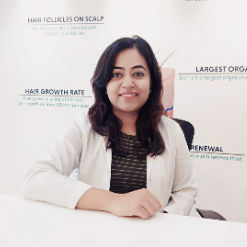How To Increase Melanin In Hair?
Learn simple, natural ways to increase melanin in your hair and slow down greying. Explore diet tips, home remedies, and expert advice for healthier, vibrant hair.

Written by Dr.Sonia Bhatt
Last updated on 3rd Jul, 2025

Introduction
As we age, the hair starts turning grey or white. This happens because the pigment called melanin, which gives hair its colour, starts to decrease. While greying is a natural part of ageing, some people experience premature greying due to genetics, stress, or nutritional deficiencies.
If you're wondering how to increase melanin in your hair naturally, this article will guide you with simple, effective, and science-backed tips.
What is Melanin and Why Does Hair Lose It?
Melanin is a natural pigment produced by cells called melanocytes. It determines the colour of your skin, eyes, and hair. There are two types of melanin in hair:
1. Eumelanin – Responsible for black and brown shades.
2. Pheomelanin – Responsible for red and yellow tones.
When melanin production slows down or stops, hair loses its colour and turns grey or white. Factors that contribute to reduced melanin include:
Ageing (natural decline in melanocyte activity)
Genetics (family history of premature greying)
Oxidative stress (free radicals damage melanocytes)
Vitamin deficiencies (especially B12, copper, and iron)
Stress and lifestyle factors (smoking, pollution, poor diet)
Consult Top Doctors for Personalised Treatment
Natural Ways to Boost Melanin in Hair
While you can't completely reverse greying, certain lifestyle changes and natural remedies may help slow it down and improve melanin production.
1. Eat a Melanin-Boosting Diet
Nutrition plays a key role in melanin production. Include these foods in your diet:
Protein-rich foods – Hair is made of keratin, a protein. Eat eggs, fish, chicken, lentils, and nuts.
Copper-rich foods – Copper helps in melanin production. Include cashews, almonds, sunflower seeds, and dark chocolate.
Vitamin B12 – Found in eggs, dairy, and fortified cereals. Deficiency is linked to premature greying.
Antioxidant-rich foods – Berries, spinach, and green tea fight oxidative stress.
Iron and zinc – Found in leafy greens, beans, and whole grains.
2. Use Natural Hair Masks
Some home remedies may help darken hair and support melanin:
Amla (Indian Gooseberry) Mask – Rich in vitamin C and antioxidants, amla can help darken hair.
Mix amla powder with coconut oil and apply weekly.
Black Sesame Seeds – Chew a spoonful daily or apply sesame oil to your scalp.
Curry Leaves & Coconut Oil – Boil curry leaves in coconut oil, strain, and massage into the scalp.
Onion Juice – Contains catalase, an enzyme that may reduce greying. Apply fresh juice for 30 minutes before washing.
3. Reduce Stress & Improve Lifestyle
Chronic stress speeds up greying by increasing oxidative damage. Try:
Yoga & meditation – Helps lower stress hormones.
Adequate sleep – 7-8 hours nightly supports cell repair.
Quit smoking – Smoking increases free radicals that damage melanocytes.
4. Avoid Harsh Hair Products
Chemical-laden shampoos, excessive heat styling, and bleaching can weaken hair and speed up greying. Opt for:
Sulphate-free shampoos
Natural hair dyes like henna or indigo
Less heat styling
5. Consider Supplements (After Doctor’s Advice)
If you have a deficiency, supplements like:
Biotin & B-complex vitamins
Copper supplements (only if deficient)
Antioxidants (Vitamin E & C)
Note: Always consult a doctor before taking supplements.
When to See a Doctor?
If you notice sudden or patchy greying, consult a dermatologist. It could be due to:
Thyroid disorders
Vitamin B12 deficiency
Autoimmune conditions (vitiligo, alopecia)
Final Thoughts
Currently, there’s no proven way to fully reverse greying, but a healthy lifestyle and proper care can slow it down. If you're concerned about premature greying, consult a dermatologist for personalised advice.
If you're experiencing excessive hair greying and want professional guidance, you can book a dermatologist consultation on Apollo 24|7. They can help diagnose underlying causes and suggest treatments.
Consult Top Dermatologists
Consult Top Doctors for Personalised Treatment
Dr. Kavitha Killaparthy
Dermatologist
23 Years • MBBS,DIPLOMA(DERMATOLOGY,VENEREOLOGY,LEPROSY)
Hyderabad
JDS Skin & Hair Clinic, Hyderabad
Dr. Mayuri Jain
Dermatologist
11 Years • MBBS, MD Dermatology , Venereology & Leprosy
Delhi
Dr Mayuri Jain Clinic, Delhi

Dr Ekansh Shekhar
Dermatologist
10 Years • MBBS MD
Lucknow
Apollo Clinic Hazratganj, Lucknow
Dr.j Girishma
Dermatologist
6 Years • MBBS MD DERMATOLOGY
Bengaluru
Apollo Medical Center, Marathahalli, Bengaluru

Dr. Ashwini T
Dermatologist
8 Years • MBBS, MD ( DERMATOLOGY )
Bengaluru
Apollo Clinic, JP nagar, Bengaluru
Consult Top Dermatologists
Dr. Kavitha Killaparthy
Dermatologist
23 Years • MBBS,DIPLOMA(DERMATOLOGY,VENEREOLOGY,LEPROSY)
Hyderabad
JDS Skin & Hair Clinic, Hyderabad
Dr. Mayuri Jain
Dermatologist
11 Years • MBBS, MD Dermatology , Venereology & Leprosy
Delhi
Dr Mayuri Jain Clinic, Delhi

Dr Ekansh Shekhar
Dermatologist
10 Years • MBBS MD
Lucknow
Apollo Clinic Hazratganj, Lucknow
Dr.j Girishma
Dermatologist
6 Years • MBBS MD DERMATOLOGY
Bengaluru
Apollo Medical Center, Marathahalli, Bengaluru

Dr. Ashwini T
Dermatologist
8 Years • MBBS, MD ( DERMATOLOGY )
Bengaluru
Apollo Clinic, JP nagar, Bengaluru
